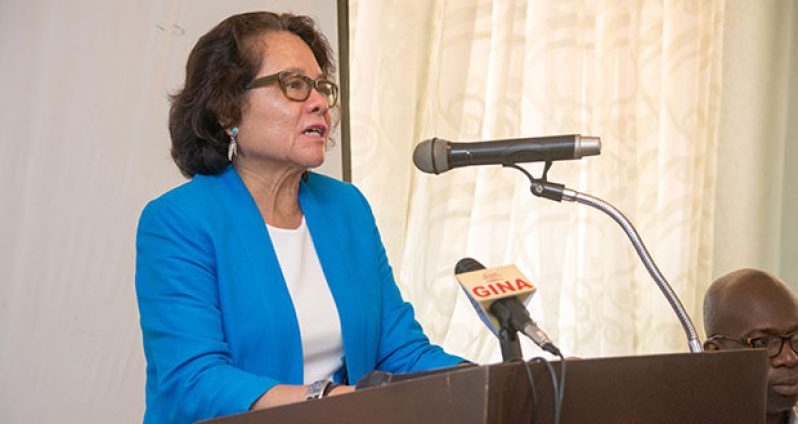By Shauna Jemmott
FIRST LADY Sandra Granger has said Government will no longer tolerate the enslaving of girls and women in Guyana through trafficking in persons (TIP), particularly in Guyana’s hinterland regions.She charged the Guyana Geology and Mines Commission (GGMC) and Guyana Forestry Commission (GFC) to work in accordance with the law to accomplish the United Nations Sustainable Development Goals (UNSDG) aimed at significantly reducing violent deaths, exploitation, and torture of children.
The First Lady made this call while delivering opening remarks at the TIP Awareness Training Workshop for Officers, held at Duke Lodge on Tuesday. She referred to specific UNSD goals, one of which aims to “significantly reduce all forms of violence and related death rates everywhere,” and to “end abuse, exploitation, trafficking, and all forms of violence against torture of children.”
Slavery was abolished here some 178 years ago, and the First Lady contended that: “fifty years after Independence, trafficking in persons must not be tolerated”.
Mrs Granger pointed out that Government, in keeping with the ‘Combating of Trafficking in Persons Act of 2005’, has reconvened the Ministerial Task Force on Trafficking in Persons, with Vice-President and Minister of Public Security Khemraj Ramjattan as its Chairperson.
One of Minister Ramjattan’s responsibilities is collecting and disseminating information on efforts to combat TIP, and training law enforcement and immigration officials.
The First Lady told the officers that they, too, have a responsibility to “significantly reduce all forms of violence and related death rates everywhere; (and) end abuse, exploitation, trafficking and all forms of violence against, and torture of, children”, according to the UN Declaration.
Declaring that women are the more common traffickers, who hold these girls hostage in a distant land away from their homes, Mrs Granger asked: “How can I not be moved, as a woman, a daughter, mother, sister, grandmother, cousin, friend? How can any of us not feel wounded to our souls when we learn of these awful incidents of exploitation and degradation?”
GO BEYOND HEARSAY
She urged the officers to go beyond hearsay; move past cultural barriers and gather evidence which would lead to the prosecution of all those who traffic persons.
“I hope that you will think of desperate young girls, lured not only from villages in the interior, but from the coastland as well, supposedly to work as cooks or waitresses, or to manage a business or serve as shop assistants; but for many, really to serve as prostitutes who, when they express the wish to return home, are presented with whopping bills and told how much money they owe to the ‘business’ – the cost of a bottle of water, of food, of lodging – so that in order to pay off this massive debt, they are forced into further servitude and/or prostitution,” the First Lady appealed.
She added that the laws of Guyana state that sexual intercourse with a minor under the age of 16 is rape, and none should have any excuse of “she wanted it”, or “I thought she was older”, or “she said she was 17”.
“The person who has sexual relations with a child under 16 is committing statutory rape. Rape is a crime of power, and must, in my view be punished to the fullest extent of the law,” the First Lady said.
AT RISK
Mrs Granger also pointed out that the lives of the victims of TIP are at risk with them being exposed to HIV and other sexually-transmitted diseases (STDs). These trafficked victims, she said, are entitled to the same rights and freedoms all other Guyanese enjoy.
“I ask you to reflect on our common humanity; to see these young girls (and boys) as our children, our sisters and brothers, cousins and friends who deserve our care and protection. I want you to see them as fellow Guyanese (who are) entitled to the same rights and freedoms we have; as valuable resources of our country; our human capital.”
As Government’s eyes and ears in the hinterland locations, Mines Officers and Forestry Rangers are on the frontline in the fight against TIP.
“As you go about performing your duties, you are our Government’s eyes and ears on the ground in our interior locations. You know who the miners and loggers are, where the mines are located, where the forests are being harvested, where miners and loggers go to get their equipment and supplies; where they go to take a break from their labours.”
Mines Officers must add to their valuable service to Guyana by simply “preventing and reporting to the relevant authorities on cases of trafficking in persons; assisting in public awareness activities; working in partnership with other officials and representatives of NGOs and communities to help eradicate this blight; and helping to ensure the prosecution of these criminals who lack human compassion and deny victims their human rights,” Mrs Granger said.




.jpg)









